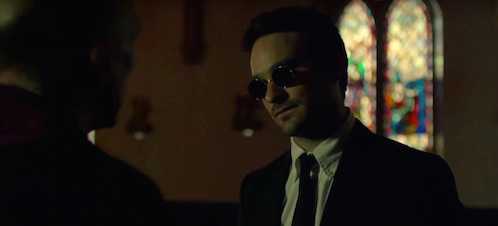The Guilt of Being Someone
Daredevil and Martin Heidegger
By Sam Bennett and Matthew William Brake
Deeply influenced by his Catholic faith, Matthew Murdock — aka Daredevil — is one of the more explicitly religious superheroes in mainstream comic books. The first season of the Netflix series Daredevil begins with Matt in a confessional, asking forgiveness for “what he’s about to do,” the inevitable and morally controversial demands that come with his vigilante life as the masked protector of Hell’s Kitchen. Due to the frequency of Matthew’s experiences of guilt, he develops a bond with the parish priest Father Lantom, who even comes to know Matt’s second life as Daredevil.
This relationship continues into the second season. After Matt is unable to save the life of one of his clients, Eliot “Grotto” Grote, he and Father Lantom have an especially poignant conversation touching on the subject of guilt.
Matt: There’s a new man in town. He’s killing people in cold blood.
Lantom: Yeah, I read about what happened with the Irish. Must have been a busy couple nights.
Matt: Yeah, I did everything I could to protect my client.
Lantom: That work is done, Matthew.
Matt: Because I failed.
Lantom: At least you tried.
Matt: Well, like you said, his life had value.
Lantom: A whole world’s been lost and others are dying one after the other Matthew. What are you looking for?
Matt: Forgiveness.
Lantom: For what?
Matt: Not doing more?
Lantom: You just said you did everything you could. If you’re the man I understand you to be, I’m sure that’s true.
Matt: Then why do I still feel guilty?
Lantom: Guilt can be a good thing. It’s the soul’s call to action. The indication that something is wrong. The only way to rid your heart of it is to correct your mistakes and keep going until amends are made. I don’t know what you didn’t do or what you should have done, but the guilt…the guilt means your work is not yet finished.
Father Lantom’s final point — that Matt’s guilty conscience indicates a wrongdoing for which he must make amends — is an unexpected shift, since Lantom previously says he “is sure that [it is] true” that Matt has “done everything” he could. Once the dialogue enters difficult terrain, Lantom resorts to a simple formula, even at the pain of inconsistency: if you feel guilty, you must have done something to warrant it. This is reminiscent of the Biblical tale of Job and his interlocutors, who despite being unable to identify a wrongdoing, insist that Job must have done something wrong, for why else would he be suffering?
Perhaps Lantom is slinking away from a troubling possibility: that just by existing, and not in virtue of any particular action or in-action, the human being is guilty. This point, that the human being “is as such guilty” (Heidegger, 274), according to its essence, was famously made by Martin Heidegger in Being and Time.
Heidegger’s essential or “existential” guilt is not a moral guilt: instead, existential guilt must be “separated from the relationship to an ought and a law such that by failing to comply with it one burdens oneself with guilt” (272). Hence, Heidegger is not making the pessimistic and familiar point that human nature is morally bankrupt.
Existential guilt descends from the form of human life as such. Heidegger maintains that human life—at all points and without fail—consists of pressing into certain possible ways of life. But this means our existence is responsible for a lack: when following a certain path, we inevitably cut ourselves off from others.
The paths we choose, for Heidegger, determine who we are. Thus, since we cannot but follow certain paths, the burden of being somebody and not someone else, of taking a stand on who we are, is built into existence. This burden is disclosed in the familiar melancholy of imagining unlived lives. But Heidegger would say that this melancholy in effect reveals a kind of guilt.
Heidegger suggests that guilt, whether existential or moral, is characterized by “being-the-ground of a nullity” (Being and Time, 272). In ordinary guilt, there has been a lack of respect for the moral law, to which the guilty is accountable. In existential guilt, by following a certain form of life, I am cutting myself off from other forms of life; my existence, or the shape of my life, is responsible for this negation. However, since this negating of other forms of life is unavoidable, and so too is the attendant guilt.
Returning to Daredevil, Matt experiences a form of guilt that no amount of priestly confession can absolve; a guilt that results from his choice to be someone, i.e., to be Daredevil. Matt’s existential guilt is not specific to himself and other heroes — to those who have ’taken a stand’ on who they are. The ordinary “everyman” also cannot avoid existential guilt by remaining forever indecisive, since the notion of not deciding, of keeping one’s identity undefined, is actually a fantasy. Regardless of how a given person shapes her life, the individual cannot escape the fact that it is defined by “thrown projection”, which for Heidegger means that we cannot escape the fact that our existence is characterized by always already pressing into certain paths of life offered by our historical situation.
Heidegger believes that the way you relate to your own guiltiness decides whether you live either an authentic or inauthentic life. The deepest meaning of inauthenticity for Heidegger is the “fleeing of [the human being] from itself” (Being and Time, 180). An inauthentic life disavows its character as thrown projection. This means fancying yourself an ordinary member of the crowd, just another “average Joe” —uncommitted, with clean hands. Inauthenticity was memorably documented in Robert Frost’s poem “The Road Not Taken,” where the narrator recalls a younger self who, “sorry” that he could “not travel both [paths] // And be one traveler”, deceived himself and imagined that the untaken path was simply being kept “for another day”.
Even Matt has moments of inauthenticity. At the end of season two, he promises Elektra that, if they survive the Hand’s assault, they will run from the world of vigilantes and assassins, and live a life of adventure together — where “adventure” is code for the fantasy of a pure life, unburdened of the burden of having decided.
Like all us, Matt can never exculpate himself of the melancholy that attends cutting oneself off from so many possible lives. The question for Matt is whether he decides to affirm this melancholy, this guilt, and accept that he must divide himself from so many paths: that being many persons — that is, being no-one — is impossible. Of course, Matt would appear to live a double life. But the true sign of the doubleness of inauthenticity is not whether you do one thing in the morning and another in the evening, but rather whether one hides from the moment that the path becomes irreversible, which is why sacrifice is the ultimate act of authenticity, insofar as you are allowing your life to be forever defined by its underlying commitment.
References
Heidegger, Martin. Being and Time. Ed. Dennis J. Schmidt. Trans. Joan Stambaugh. Albany, NY: State U of New York, 2010. Print.
Sam Bennett received an M.A. in philosophy at George Mason University and lives in Manassas, Virginia.
Matthew William Brake is a dual masters student in Interdisciplinary Studies and Philosophy at George Mason University. He also has a Master of Divinity from Regent University and is a teaching pastor at Hill City Church in Arlington, VA. He has published numerous articles in the series Kierkegaard Research: Sources, Reception, Resources. He is a contributor for Noetic (www.noetic-series.com). He has chapters in Deadpool and Philosophy, Wonder Woman and Philosophy, and Mr. Robot and Philosophy. Check out his blog at www.popularcultureandtheology.com.





Pingback: Daredevil and Guilt - Rank Series
Pingback: The Guilt of Being Someone: Daredevil and Martin Heidegger – Pop Culture and Theology
I very much enjoyed your discussion of Heideggers’s contrast between moral guilt and existential guilt. It explains a lot, I think, of the guilty feelings, at least in my life, that seem to arise inevitably, despite not having done something “wrong.”